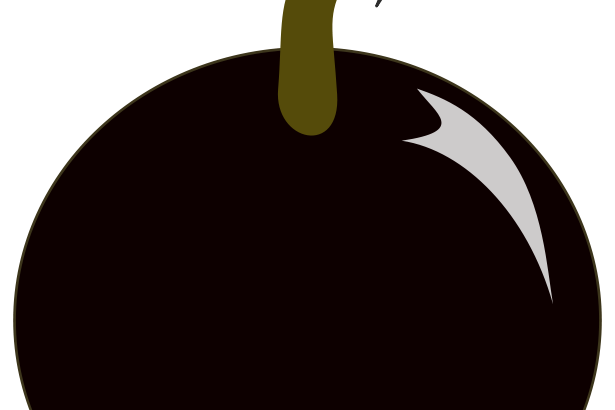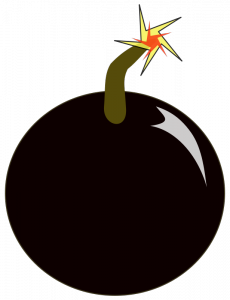It’s no secret that many, many Geocaches have caused bomb scares in the U.S. and Canada since our game was invented in 2000. Elsewhere in the world too, of course, but we are a North American based blog, and the majority of these incidents occur in the United States. We doubt that anyone keeps statistics on the number of bomb squad incidents, but the Blogger, who has checked in and read the Geocaching.com forums several times a week for almost 10 years (where almost every incident is reported), would estimate the average to be between two and three per month.
A Google search of the phrase “Geocaching Bomb Scares” generally returns two Geocaching.com bookmark lists in the top results, both of which we at the blog have been aware of for several years. Bomb Scares and Other Fun Stuff, is the older of the two. However, this list has essentially been abandoned, and a quick scan of it tells you it hasn’t had any new caches posted to it since 2007, although the adopted owner of the list is still an active Geocacher. The other top result, Bad Ideas, Bomb Scares, etc. is a very well maintained and regularly updated bookmark list, and is is the subject of this Blog post. The bookmark list owner, David Brierley (Geocaching.com Username: dbrierley), has graciously agreed to be interviewed by this Blog.
OCNA Blog: Where are you from, how did you first hear about Geocaching, and when did you start?
David: I’m from Rhode Island and I started geocaching in 2005. I probably heard
about geocaching while looking into buying a GPS receiver for hiking.
OCNA Blog: What would you say inspired you to create this bookmark list?
David: Sometime after starting in geocaching, I found the earlier “Bomb Scares and Other Fun Stuff” bookmark list, which was no longer maintained at that
point.
OCNA Blog: Many Geocachers (myself included) have noticed that you advertise this bookmark list on Google AdSense ads. Why do you do this?
David: Nearly all of the geocaches in the bookmark list are archived, making them
unavailable by searching the geocaching site or through search engines; so
advertising the list is the only way to generate awareness.
OCNA Blog: How do you hear about the unfortunate caches that make the bookmark list? Do you use Google News alerts? Do you have to do a lot of research tying the news reports to a particular cache?
David: The geocaches are mostly discovered through Google News alerts; the likely geocache can often be found within minutes. Some caches have been suggested by other geocachers via email and others have been found through the forums.
OCNA Blog: Do you feel that a majority of Geocaches that cause bomb scares are
due to them being on private property without permission? My experience over
the years from reading the Groundspeak forums suggests so. Not all of them,
but I’d have to guess over 50% of them.
David: I haven’t done any counts, but absence of permission seems to be a major
factor. Another factor seems to be the container type — unlabeled
nontransparent containers, especially pipe-like containers, in areas where
there are many people.
OCNA Blog: When a cache causes a bomb scare, the cache page usually turns into a “forum”, with local cachers (many of whom have found the cache in question) chiming in. The theme generally leans towards the authorities being overzealous. Do you believe the authorities are being overzealous in many cases?
David: Law enforcement personnel have to consider all possibilities, especially
when dealing with an unlabeled and opaque container: it could be trash, it could be an explosive, it could be a geocache or letterbox, it could be an explosive placed in an actual geocache, etc. Assumptions probably cannot be made as to what a bomb or a geocache is supposed to look like. There might not be time to search the various listing sites for geocaches and letterboxes and the geocache/letterbox might not even be listed with any service. Complaints about law enforcement responses often seem to be attempts to divert attention away from permission issues.
OCNA Blog: Do you have any advice for cache hiders to stay the heck off of your
bookmark list?
David: There are no guaranteed ways to avoid problems, but there seem to be
precautions that can be taken to reduce the chances. These are not new; people have been talking about them for years in the forums:
- The most important precaution for caches on private property is to get
firm permission, preferably written, from the owner or manager; seek
permission from someone in authority to make decisions. Show the
owner/manager the geocache and where it will be hidden. - Make sure the container is location-appropriate. Media reports mention
law enforcement requests to use labeled transparent containers in areas
frequented by the public.
Thanks to David for doing that interview with us! I really liked his answers. Again, here is the link to the Bad Ideas, Bomb Scares, etc. bookmark list. There are limitations to what you can do with Geocaching.com bookmark lists, but David has done the best you can do, with what you’re given to work with. He has used BB code to insert links to relevant media stories, forum discussions and nearby caches in the description for the caches on the list, where applicable. And in the main list description, he posts links to his Facebook and Twitter accounts, where he posts updates to the list. And he also has a Geocache, Bomb Scares, etc. board on Pinterest. This blog post was a little short on graphics this week, but we didn’t want to copy any of the mostly news media in orgin copywrited photos that appear there on Pinterest. Feel free to check those out.
Also feel free to comment on this blog post! We’re always a little short on those too at the OCNA blog, although Blogger and Google Analytics stats show this blog has decent readership. Are you one of the plurality of Geocachers who feel law enforcement overreacts almost every time a Geocache is called in as a suspicious container? Let us know!

